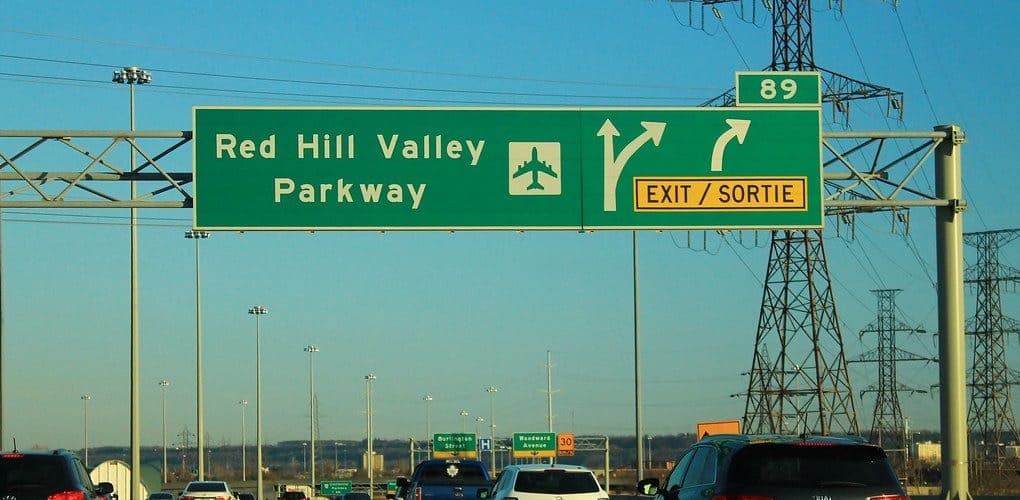Hamilton councillor who once called Red Hill Valley Parkway expansion ‘so 1950’ is now calling for it
Published April 12, 2022 at 5:25 pm

A departing Hamilton city councillor is calling for an expansion of Red Hill Valley Parkway, which he once called “so 1950.”
The Red Hill, the city-run roadway built on a floodplain, is also about to be the subject of a long-awaited public inquiry that begins in under two weeks.
Ward 4 Coun. Sam Merulla has backed off on the notion of making Hamilton’s plan for the removal of heavy trucks from downtown neigbhourhoods conditional upon expanding the RHVP. The 22-year councillor, who is not running for re-election this fall, suggested during a meeting last week that he would do so. The motion that he has added to the agenda for the city council meeting tomorrow morning (April 13) does not mention the truck routes plan.
Rather, it calls for “authoriz(ing) staff to make a proposal to the Red Hill Valley Joint Stewardship Board for the expansion of the Red Hill Creek Expressway.” The stewardship board oversees environmental management of the ecosystem that the four-lane, eight-kilometres RHVP runs through while connecting the Queen Elizabeth Way highway to the city-managed Lincoln M. Alexander Parkway. It was created following the negotiation of several agreements between the City of Hamilton and Haudenosaunee in the early 2000s.
The current motion mentions that a consultant has already completed the “main technical elements” of a mobility feasibility study regarding the RHVP and the LINC that began over a year ago in January 2021.
While the Merulla of 2022 is proposing a highway expansion, his 2015 iteration espoused a different position. Environment Hamilton posted a clip of the veteran councillor from that year when he criticized the idea of expanding the RHVP and Lincoln M. Alexander Expressway (LINC).
“Expansion of this highway is so 1950,” Merulla said. “We are thinking like Hamiltonians from 1950, as opposed to the new Hamiltonians who are moving into this town today, who do not want to drive to Toronto to work. They want public transit to bring them there. So I can’t, for the life of me, understand why we are thinking in the terms of 1950, when we are faced with the real demands of 2015 … this messsaging is not reflective of what this city needs, at this time.”
Whaaat? This is what Cllr Merulla has said on the record in the past on this one – just a snippet of a pretty passionate speech against widening RHVP + the LINC pic.twitter.com/6ut24dKBSl
— Environment Hamilton (@EnvHamilton) April 9, 2022
At that time seven years ago, the public did not know of about the 2013 report about inadequate friction on the roadway, which was the spur for the public inquiry into the safety of the RHVP. That is set to begin on April 25, one week from next Monday.
In September 2018, the previous city council was told by Wood Consulting that the city must prepare for more frequent 100-year storm events that can cause flooding on the RHVP. Heavy rainstorms are increasing in frequency and intensity due to climate change. The consultant’s report did state that the stewardship of the natural environment around the roadway was generally strong.
However, in a span of under 12 months in 2009 and ’10, the RHVP’s storm surge system failed four times. In a downpour in July 2010, its storm water retention pond overflowed and parts of the expressway were under two feet of water. A report in the Hamilton Spectator said the water was deep enough for “ducks to swim out onto the highway and feed on debris floating on the surface.”
Civil engineering experts and climate activists also contend that increasing highway capacity only exacerbates congestion, rather than solving it. The latter use the term “induced demand” to describe how congestion gets worse, since more drivers are on the road and travel distances increase.
Hamilton’s elected leadership declared a climate crisis three years ago.
Last November, they also voted 13-3 against an urban boundary expansion, with Merulla voting with the majority. That urban boundary freeze has since come under attack from the Ontario PC Party government through its Bill 109, titled the More Homes For Everyone Act.
Mayor Fred Eisenberger has opposed Bill 109, saying it will do the opposite of what it itends to effect.
In any event, there appears to be no roadblock to the revised truck routes ban. The measure involved several years of consultations with affected residents and representatives of industries, particularly in agribusiness, that will also be affected by truck drivers being re-routed away from downtown streets. It has passed unanimously at the subcommittee and public works committee levels.
The vote was 9-0 at committee on April 4, which means a majority of the 16-member city council have already shown support before the ratification vote. Couns. John-Paul Danko (Ward 8), Jason Farr (2), Lloyd Ferguson (12), Tom Jackson (6), Nrinder Nann (3), Esther Pauls (7), Maria Pearson (10), Russ Powers (5) and Arlene VanderBeek (13) voted in favour last week.
insauga's Editorial Standards and Policies advertising





